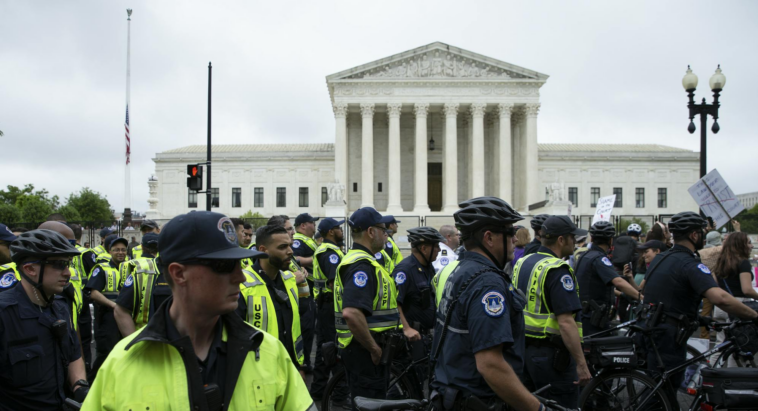WASHINGTON—The House of Representatives on Wednesday passed legislation Republicans say will roll back what they describe as “anti-police” measures in the District of Columbia.
The CLEAN Act aims to repeal the D.C. Council’s Comprehensive Policing and Justice Reform Amendment Act of 2022, which imposed sweeping restrictions on law enforcement in Washington, D.C.
Rep. Andrew Clyde (R-GA) sponsored the bill in the House, while Sen. Ted Cruz (R-Texas) is carrying identical legislation in the Senate.
The House bill passed by a vote of 233-190, with 20 Democrats crossing the aisle to side with Republicans. The Senate version remains in the committee process.
According to Clyde, the D.C. Council’s act weakens law enforcement by “banning longstanding and proven police tactics,” “stripping legal protections and due-process rights from officers,” “threatening officer safety by authorizing the public release of certain records,” and “imposing new limits on protest policing and the use of non-lethal crowd-control tools.”
In 2023, Clyde attempted to pass a resolution to block the Act, which President Joe Biden vetoed at the time.
The Daily Wire’s Leif Le Mahieu exclusively reported this week that the White House’s Office of Management and Budget endorsed the legislation. It was also endorsed by the D.C. Police Union and the Fraternal Order of Police.
Clyde’s legislation would reportedly “reverse unnecessary and detrimental restrictions placed on officers of the D.C. Metropolitan Police Department (MPD).”
Restrictions include “removing all officers and police union representatives from the Police Complaints Board, requiring juries to consider whether an officer consulted with mental health, behavioral health, or social workers before using deadly force, and imposing approval hurdles for the use of riot gear and less-lethal projectiles.”
The letter of support from the administration said removing these restrictions would “help restore the effectiveness of the MPD and maintain law and order in Washington, D.C.”
Following its passage, Clyde said in a statement to The Daily Wire that he was “incredibly pleased” that his legislation passed with bipartisan support and he looks forward to a “similar outcome” in the Senate.
“For years, the D.C. City Council’s Comprehensive Policing and Justice Reform Emergency Amendment Act has prevented our men and women in blue from effectively protecting Americans in our nation’s capital, hindered the MPD’s ability to recruit and retain officers, and exacerbated Washington’s crime crisis,” Clyde said.
He added that the CLEAN D.C. Act “strengthens and codifies President Trump’s successful efforts to restore law and order in Washington.”
On the floor Wednesday, House Committee on Oversight and Government Reform Chairman James Comer (R-KY) spoke in support of the bill and said the law “stripped law enforcement officers of many tools needed to execute their duties safely and without fear of retribution, as well as limited their options in situations of life or death.”
Comer said it also “created new opportunities for anti-police activists to harass law enforcement officers and added many undue burdens and requirements to officers in the D.C. Metropolitan Police Department.”
Right now, DailyWire+ annual memberships are fifty percent off during our Black Friday sale. Join now at dailywire.com/blackfriday.
However, not all lawmakers were on board, with several Democrats pushing back against the measure ahead of the vote.
Rep. Robert Garcia (D-CA) said he “strongly” opposes the bill and believes it would “damage the trust between D.C. police and the communities they protect and serve.”
“In D.C., these measures increased accountability for ‘bad apples’ with independent civilian oversight, clean disciplinary process, and mandatory reporting for over use-of-force incidents. It also prohibited the hiring of officers with prior misconduct, and it prohibited choke holds. It improved training for officers,” Garcia said.
“By repealing this anti-police law, we will make our nation’s capital safer,” Comer said.
House Majority Whip Tom Emmer told The Daily Wire that Americans “deserve a safe and beautiful Washington, D.C., and President Trump and House Republicans are making that a reality.”
“Cashless bail and a weakened police force only empower dangerous criminals to continue to wreak havoc on visitors and residents alike. By passing these bills, we are ensuring that DC finally puts law-abiding citizens over repeat violent offenders. It’s common sense,” Emmer said.
Cruz told The Daily Wire that he urges the Senate to send it to the President “expeditiously.”
“Violent crime has become endemic in Washington, D.C. due to specific, deliberate decisions made by Democrats. The CLEAN D.C. Act would strengthen police morale, improve officer retention, and reverse the decline in public safety caused by those decisions,” Cruz said.
The Senate bill has been referred to the Committee on Homeland Security and Governmental Affairs. The bill must now pass the Senate before it can go to the President’s desk.



